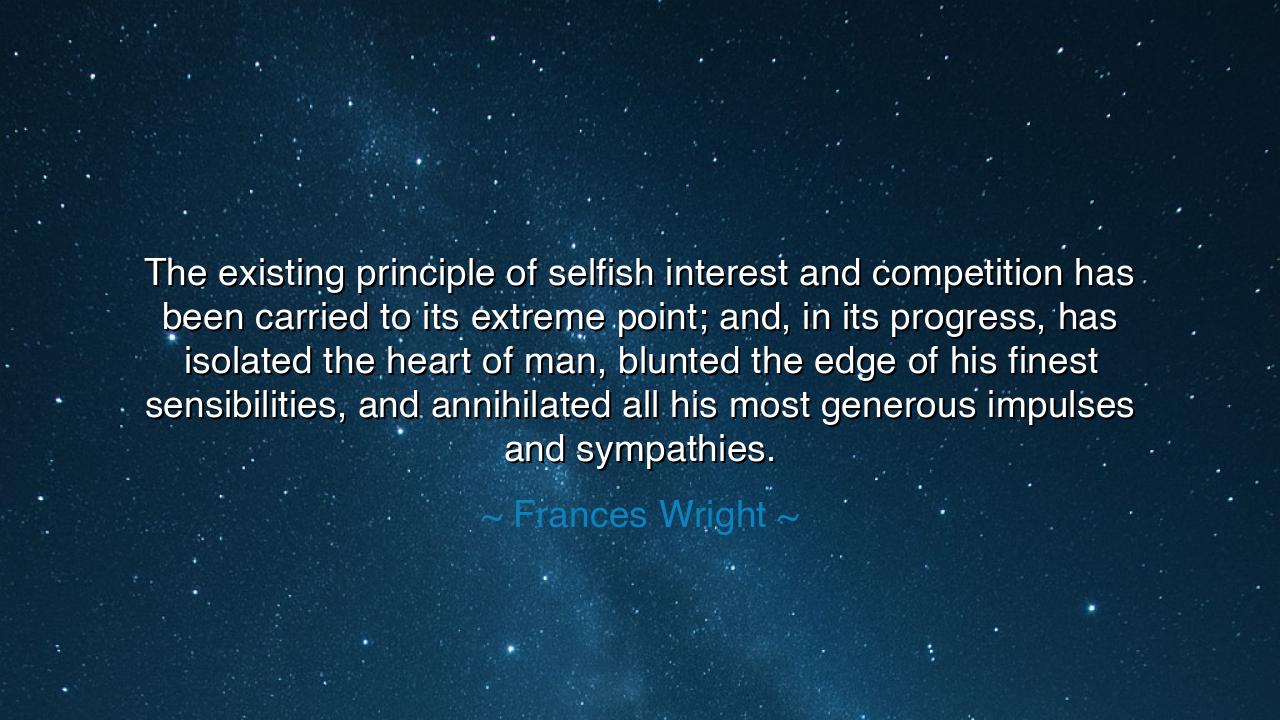
The existing principle of selfish interest and competition has
The existing principle of selfish interest and competition has been carried to its extreme point; and, in its progress, has isolated the heart of man, blunted the edge of his finest sensibilities, and annihilated all his most generous impulses and sympathies.






Hear the fiery words of Frances Wright, reformer, thinker, and bold voice of the nineteenth century: “The existing principle of selfish interest and competition has been carried to its extreme point; and, in its progress, has isolated the heart of man, blunted the edge of his finest sensibilities, and annihilated all his most generous impulses and sympathies.” This cry comes not from idle reflection, but from the deep well of one who looked upon her age and saw the wounds of unchecked ambition. In these words, she does not merely denounce commerce or rivalry, but the spirit of selfish interest that, when unrestrained, poisons the very soul of society.
The meaning of her saying is as sharp as a sword. Competition, when carried in balance, can strengthen, sharpen, and refine. It can lift the weak, challenge the strong, and lead to discovery. But when it is exalted above all else—when men worship it as their only law—it becomes a tyrant. It isolates the heart, turning neighbor against neighbor, brother against brother, until sympathy fades and the voice of generosity is silenced. The finest sensibilities—the tenderness to see another’s suffering, the humility to aid without reward—are blunted, dulled like a blade left to rust. In their place grows greed, cruelty, and indifference.
History offers us many warnings of this truth. Look to the Gilded Age of America, when vast fortunes rose upon railroads and steel, and a handful of men—Carnegie, Rockefeller, Vanderbilt—amassed power greater than kings. Industry roared forward at lightning pace, yet the worker in the factory and the child in the mine were left in misery. Selfish interest and competition, carried to extremes, created wealth beyond measure but annihilated sympathies, leaving a trail of suffering that could not be ignored. Only when reformers, unions, and leaders demanded justice did compassion begin to balance ambition.
The ancients, too, knew of this danger. The Spartans exalted strength and competition in all things, training boys to conquer or perish. Their warriors were fierce, their armies feared—but their society was barren of tenderness, and their state, though mighty in arms, withered in spirit. Meanwhile, Athens, with its festivals, its theaters, its care for beauty, showed that generosity and sympathy could stand alongside ambition. In the end, the relentless severity of Sparta doomed it, while Athens, despite its flaws, gave the world philosophy, art, and democracy.
The lesson for us is plain: ambition must be yoked to compassion, and competition must be tempered with generosity. To strive is noble; to create is divine; but to exalt only the self is to cut away the heart of humanity. When one’s impulses of sympathy are killed, when one cannot feel for the stranger or lift the fallen, then one’s victories become ashes. The truest greatness is not in rising above others, but in lifting others as you rise.
Practical action follows: examine your life and ask—Where has selfish interest ruled me? Where has competition blinded me to kindness? In your work, seek not only profit, but fairness. In your striving, leave room for mercy. If you lead, let your leadership protect the weak as well as reward the strong. Give, not because it brings return, but because it restores the humanity that competition tries to steal.
So let the words of Frances Wright endure. She warns us that unchecked selfish interest is a fire that consumes the spirit, a storm that leaves the earth barren of compassion. Let us instead cultivate the soil of sympathy, sharpen our sensibilities with acts of kindness, and rekindle the flame of generous impulses. For only when the heart of man beats in balance with ambition shall progress endure, not as a weapon against our neighbor, but as a blessing for all.






AAdministratorAdministrator
Welcome, honored guests. Please leave a comment, we will respond soon